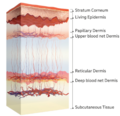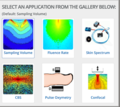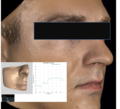Computer Graphics Research Group Projects
- Colliding Conversations: virtual reality and beyond - a series of five video converstations about Virtual Reality between expert practitioners in different disciplines
- VRroom - comparing peripheral vision in VR and CAVE
- Training orchestral conductors
- Landscape-scale augmented reality
- Abstraction of human figures - in impressionist art and children's picture books
- The language of colour space - what do we mean by the 'opposite' of 'blue'?

Light transport theory and GPU-accelerated computations (forward and inverse)
beyond ray optics (wave, electromagnetic and quantum effects). Spin and orbital angular momentum of light and consideration of their applications in Computer Graphics, Biomedical Imaging and development of novel Optical Diagnostics techniques (see
our recent paper).

Acquisition of spatially and volumetrically inhomogeneous properties of human tissues (e.g. skin) using Artificial Intelligence (AI) based methods. Real-time
in situ estimation of certain specific tissue properties of interest such as distributions of melanin, blood, oxygenation, collagen content, etc. for photorealistic physically-based rendering, optical biopsy and biomedical visualization (see
our recent paper).

An educational Monte Carlo computational platform for the needs of Biomedical Optics, imaging/visualization and Computer Graphics
(available online). The platform provides access to several most popular applications such as real-time skin appearance rendering, spectra simulation, polarization, etc. The platform is supported by several international collaborations including recently awarded Dumont d'Urville scientific cooperation program between VUW and École Polytechnique, France (see
a link).

Creation of biophysically-based shading models of human skin and novel methods for real-time realistic simulation of skin appearance using emerging GPU-accelerated ray-tracing technologies (e.g. NVIDIA RTX). Variations in both structural e.g. surface roughness and chromophore concentration changes in skin layers such as distribution of blood, melanin, collagen, index of blood oxygen saturation, water, pigment content, etc. are considered.
 Light transport theory and GPU-accelerated computations (forward and inverse) beyond ray optics (wave, electromagnetic and quantum effects). Spin and orbital angular momentum of light and consideration of their applications in Computer Graphics, Biomedical Imaging and development of novel Optical Diagnostics techniques (see our recent paper).
Light transport theory and GPU-accelerated computations (forward and inverse) beyond ray optics (wave, electromagnetic and quantum effects). Spin and orbital angular momentum of light and consideration of their applications in Computer Graphics, Biomedical Imaging and development of novel Optical Diagnostics techniques (see our recent paper).
 Acquisition of spatially and volumetrically inhomogeneous properties of human tissues (e.g. skin) using Artificial Intelligence (AI) based methods. Real-time in situ estimation of certain specific tissue properties of interest such as distributions of melanin, blood, oxygenation, collagen content, etc. for photorealistic physically-based rendering, optical biopsy and biomedical visualization (see our recent paper).
Acquisition of spatially and volumetrically inhomogeneous properties of human tissues (e.g. skin) using Artificial Intelligence (AI) based methods. Real-time in situ estimation of certain specific tissue properties of interest such as distributions of melanin, blood, oxygenation, collagen content, etc. for photorealistic physically-based rendering, optical biopsy and biomedical visualization (see our recent paper).
 An educational Monte Carlo computational platform for the needs of Biomedical Optics, imaging/visualization and Computer Graphics (available online). The platform provides access to several most popular applications such as real-time skin appearance rendering, spectra simulation, polarization, etc. The platform is supported by several international collaborations including recently awarded Dumont d'Urville scientific cooperation program between VUW and École Polytechnique, France (see a link).
An educational Monte Carlo computational platform for the needs of Biomedical Optics, imaging/visualization and Computer Graphics (available online). The platform provides access to several most popular applications such as real-time skin appearance rendering, spectra simulation, polarization, etc. The platform is supported by several international collaborations including recently awarded Dumont d'Urville scientific cooperation program between VUW and École Polytechnique, France (see a link).
 Creation of biophysically-based shading models of human skin and novel methods for real-time realistic simulation of skin appearance using emerging GPU-accelerated ray-tracing technologies (e.g. NVIDIA RTX). Variations in both structural e.g. surface roughness and chromophore concentration changes in skin layers such as distribution of blood, melanin, collagen, index of blood oxygen saturation, water, pigment content, etc. are considered.
Creation of biophysically-based shading models of human skin and novel methods for real-time realistic simulation of skin appearance using emerging GPU-accelerated ray-tracing technologies (e.g. NVIDIA RTX). Variations in both structural e.g. surface roughness and chromophore concentration changes in skin layers such as distribution of blood, melanin, collagen, index of blood oxygen saturation, water, pigment content, etc. are considered.
